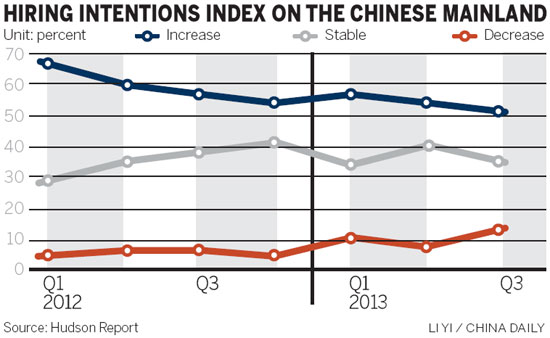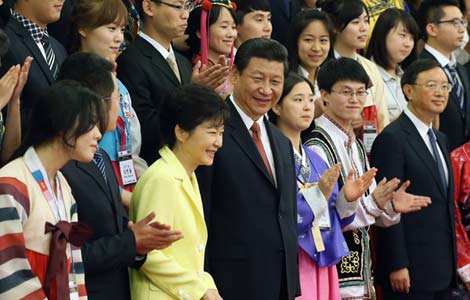Hiring index signals further job weakness
Updated: 2013-06-28 08:16
By Shi Jing in Shanghai (China Daily)
|
||||||||
|
A new graduate asks about employment opportunities at a job fair in Jiujiang, Jiangxi province, on Monday. A Hudson survey of 816 employers found that 13.2 percent will cut staff in the next three months, 6.2 percentage points more than in the second quarter. Zhang Haiyan / For China Daily |
An index measuring employers' hiring intentions for the third quarter on the Chinese mainland will drop to 51.5, the lowest since the beginning of 2010, according to the latest Hudson Report released in Shanghai on Thursday.
Hiring intentions have been declining all year.
Among all the 816 Chinese employers interviewed by the global talent solutions company, 13.2 percent said they would decrease headcount in the next three months, 6.2 percentage points more than in the second quarter.
"The government's support of quality growth has resulted in a slightly slower rate of growth and many organizations are focusing on achieving internal efficiency and productivity gains in the first instance, rather than adding headcount," said Bi Lin, joint general manager of Hudson Shanghai.
Bi added that compared with the index's lowest point of 33 when the global financial crisis broke out in 2009, the relatively lower hiring demand at present is still within a "healthy and controllable boundary".
"The employment growth rate has been very limited ever since 2008. But on the other hand, the unemployment rate has been going up, especially when a large number of export-oriented companies are shutting and laying off people.
"In addition, gloomy overseas job markets have forced some Chinese people to come back. All of these [developments] have made competition in the Chinese job market even more intense," said Li Rong, editor-at-large at Bloomberg Businessweek, at the 2013 China Human Resources Conference held in Shanghai last Thursday.
However, highly qualified and specialized workers, especially those engaged in research and development, chemicals, healthcare, scientific and laboratory roles and digital marketing and e-commerce, are highly sought after, the Hudson Report said.
Su Yong, director of the business administration department at the School of Management at Fudan University in Shanghai, agreed that the era when China had advantages from cheap labor is over. "Employees with higher qualifications and specific skills are more needed."
The hiring intentions index of the property and construction industry is the highest among all monitored industries, reaching 77.1 for the third quarter.
When all other property sectors are facing more challenges, commercial property, especially retail property, is relatively better off amid economic uncertainties, according to Joe Zhou, heard of research for Jones Lang LaSalle East China.
Hudson found that the commercial property sector is being driven by tourism properties and cultural and creative industry properties, among others.
"Overseas capital is more sensitive to the central government's tightening policies. But domestic capital is showing more confidence in the property market" including these booming sub-sectors, said Bi.
About 71.2 percent of the respondents in the healthcare and life sciences industries said they would hire more staff in the third quarter. At least four of the world's top 10 pharmaceutical companies are setting up global centers in China, especially research and development centers, resulting in higher demand from this industry, as Bi explained.
"We will definitely hire more staff in China this year, especially since we set up a joint venture with Zhejiang Hisun Pharmaceutical Co in September last year," said Lyu Hong, vice-president of human resources for Asia-Pacific at Pfizer.
Lyu added that the company has attached great importance to R&D in China and thus has a robust demand for related staff.
Simon Lance, regional director of China at the global specialist recruiting group Hays, agreed that the healthcare industry will further grow in China as the nation ages.
Wang Ying contributed to this story.
shijing@chinadaily.com.cn

(China Daily USA 06/28/2013 page17)

 NASA telescope to probe solar mystery
NASA telescope to probe solar mystery
 Visit aids 'trust-building process'
Visit aids 'trust-building process'
 King of Pop returns
King of Pop returns
 Crowds cheer Court decision on gay marriage
Crowds cheer Court decision on gay marriage
 Hiring index signals further job weakness
Hiring index signals further job weakness
 Dance becomes popular stress relief
Dance becomes popular stress relief
 Philippine, US start Naval exercise in S China Sea
Philippine, US start Naval exercise in S China Sea
 Supreme Court gay rights ruling celebrated across US
Supreme Court gay rights ruling celebrated across US
Most Viewed
Editor's Picks

|

|

|

|

|

|
Today's Top News
Senate OKs immigration reform; hurdles remain
Snowden could request asylum in Russia: official
US collects Internet data on citizens
Boston bombing suspect accused in 4 deaths
816 elected in provincial leadership reshuffle
US adds to DPRK sanctions list
Chinese pros put trust in blogs
More Americans see Snowden as patriot: Poll
US Weekly

|

|







